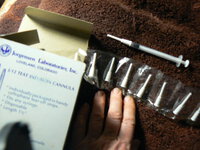Hi everyone. I have recently adopted a pair of canaries from someone who had them for a long while in pretty bad condition. I am not sure of the age, but they might be about 3 or 5 years old. they were kept in a fairly small cage in a dim lighted kitchen where food was cooked on a daily basis. Apparently, they bred yearly until this spring, when they didn`t lay any egg, after which never trying to build a nest again.
I had them for about 3 days now in a room separate from the rest of my birds for quarantine and noticed they are very kight and have trouble jumping from one perch to another (atrofied muscles maybe?) and are really quiet, letting out only short chirps from time to time, mostly if the lightbulb is turned on in the morning. they do eat fine and are in molt right now
Do you have any tips in putting these birds back on tracks?
I had them for about 3 days now in a room separate from the rest of my birds for quarantine and noticed they are very kight and have trouble jumping from one perch to another (atrofied muscles maybe?) and are really quiet, letting out only short chirps from time to time, mostly if the lightbulb is turned on in the morning. they do eat fine and are in molt right now
Do you have any tips in putting these birds back on tracks?
Attachments
-
97.2 KB Views: 14
-
121 KB Views: 14

![20211115_145754[1].jpg](/data/attachments/373/373536-3e3a26d1d73827ecc6b925be73491285.jpg)
![20211117_165609[1].jpg](/data/attachments/373/373537-d56246fcdf558e74b7879f22493cbd84.jpg)


